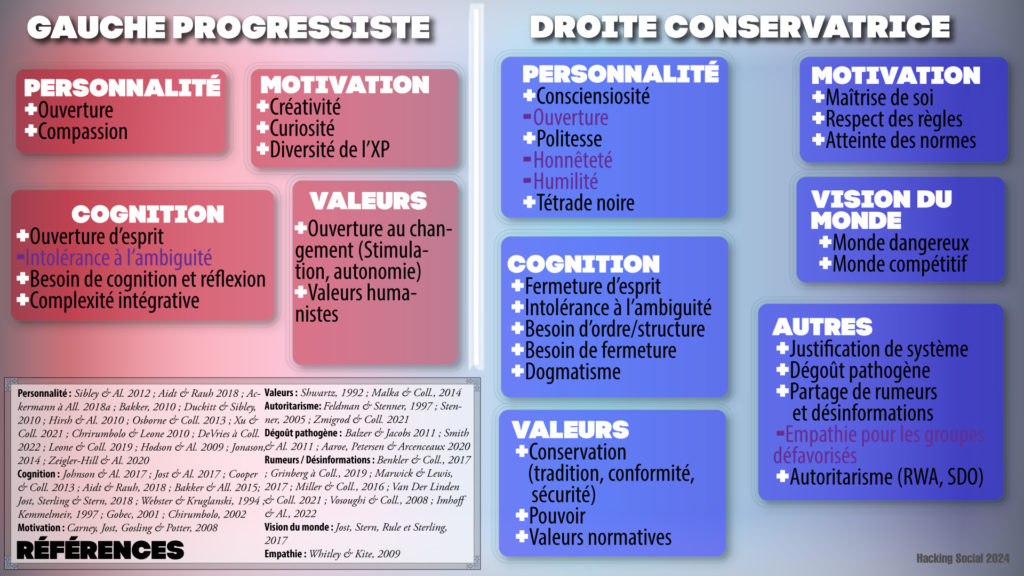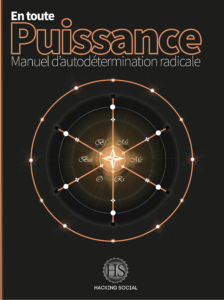La psychologie politique : ça a vraiment du sens ?
Le 19 mai dernier, Viciss et moi-même étions invitées au 75 ans du Comité Para. Nous y avons tenu une table ronde et une conférence à l’Université Libre de Bruxelles, cette dernière étant une introduction à la psychologie politique. Malheureusement, je n’ai pas la possibilité de pouvoir publier ici cette conférence en raison de problèmes techniques. Compte tenu de cette période délicate (une législative anticipée avec la possibilité de l’arrivée de l’extrême droite au pouvoir en France), nous avons décidé de refaire cette conférence dans un format minimaliste (très peu de montage, pas d’animation, son, etc.). Je vais ici essayer d’introduire ce qu’est la psychologie politique en partant de ses apriori. Nous nous demanderons notamment si nos attitudes et comportements politiques sont rationnels, si nous sommes d’abord motivés par des intérêts personnels (pour ne pas dire égoïstes), s’il est raisonnable d’interroger les affinités idéologiques sous l’angle de la psychologie, et si oui ce que signifierait « gauche » et « droite ». Vous retrouverez nos éléments bibliographiques dans nos sources. Portez-vous bien !

Bibliographie
- Aidt, T., & Rauh, C. (2018). The Big Five personality traits and partisanship in England. Electoral Studies, 54, 1-21.
- Ackermann, K., Zampieri, E., & Freitag, M. (2018). Personality and voting for a right‐wing populist party–Evidence from Switzerland. Swiss political science review, 24(4), 545-564.
- Aldrich, J. H. (1993). Rational choice and turnout. American journal of political science, 246-278.
- Allport, F. H. (1954). The structuring of events: outline of a general theory with applications to psychology. Psychological Review, 61(5), 281.
- Altemeyer, B. (1998). The other “authoritarian personality”. In Advances in experimental social psychology (Vol. 30, pp. 47-92). Academic Press.
- Aarøe, L., Petersen, M. B., & Arceneaux, K. (2020). The behavioral immune system shapes partisan preferences in modern democracies: Disgust sensitivity predicts voting for socially conservative parties. Political Psychology, 41(6), 1073-1091.
- Asbrock, F., & Fritsche, I. (2013). Authoritarian reactions to terrorist threat: Who is being threatened, the Me or the We?. International journal of psychology, 48(1), 35-49.
- Bakker, B. N. (2017). Personality traits, income, and economic ideology. Political Psychology, 38(6), 1025-1041.
- Bakker, B. N., & Lelkes, Y. (2018). Selling ourselves short? How abbreviated measures of personality change the way we think about personality and politics. The Journal of Politics, 80(4), 1311-1325.
- Balzer, A., & Jacobs, C. M. (2011). Gender and physiological effects in connecting disgust to political preferences. Social Science Quarterly, 92(5), 1297-1313
- Buckels, E. E., Trapnell, P. D., & Paulhus, D. L. (2014). Trolls just want to have fun. Personality and Individual Differences, 67, 97–102
- Carney, D. R., Jost, J. T., Gosling, S. D., & Potter, J. (2008). The secret lives of liberals and conservatives: Personality profiles, interaction styles, and the things they leave behind. Political psychology, 29(6), 807-840.
- Citrin, J., & Green, D. P. (1990). The self-interest motive in American public opinion. Research in micropolitics, 3(1), 1-28.
- Chirumbolo, A. (2002). The relationship between need for cognitive closure and political orientation: The mediating role of authoritarianism. Personality and individual differences, 32(4), 603-610.
- Chirumbolo, A., & Leone, L. (2010). Personality and politics: The role of the HEXACO model of personality in predicting ideology and voting. Personality and Individual Differences, 49(1), 43-48.
- Chong, D. (2000). Rational lives: Norms and values in politics and society. Chicago: University of Chicago Press.
- Cooper, C. A., Golden, L., & Socha, A. (2013). The big five personality factors and mass politics. Journal of Applied Social Psychology, 43(1), 68-82.
- Coppock, A., & Green, D. P. (2022). Do belief systems exhibit dynamic constraint?. The Journal of Politics, 84(2), 725-738.
- Cotterill, S., Sidanius, J., Bhardwaj, A., & Kumar, V. (2014). Ideological support for the Indian caste system: Social dominance orientation, right-wing authoritarianism and karma. Journal of Social and Political Psychology, 2(1).
- Damasio, A. R. (1994). Descartes’ error and the future of human life. Scientific American, 271(4), 144-144.
- Davidov, E., Seddig, D., Gorodzeisky, A., Raijman, R., Schmidt, P., & Semyonov, M. (2020). Direct and indirect predictors of opposition to immigration in Europe: individual values, cultural values, and symbolic threat. Journal of Ethnic and Migration Studies, 46(3), 553-573.
- De Vries, R. E., Wesseldijk, L. W., Karinen, A. K., Jern, P., & Tybur, J. M. (2022). Relations between HEXACO personality and ideology variables are mostly genetic in nature. European Journal of Personality, 36(2), 200-217.
- Druckman, J. N., Klar, S., Krupnikov, Y., Levendusky, M., & Ryan, J. B. (2021). How affective polarization shapes Americans’ political beliefs: A study of response to the COVID-19 pandemic. Journal of Experimental Political Science, 8(3), 223-234.
- Duckitt, J. (2001). A dual-process cognitive-motivational theory of ideology and prejudice. In Advances in experimental social psychology (Vol. 33, pp. 41-113). Academic Press.
- Duckitt, J., & Sibley, C. G. (2010). Personality, ideology, prejudice, and politics: A dual‐process motivational model. Journal of personality, 78(6), 1861-1894.
- Eagly, A. H., & Chaiken, S. (1993). The psychology of attitudes. Harcourt brace Jovanovich college publishers.
- Echebarria‐Echabe, A., & Fernández‐Guede, E. (2006). Effects of terrorism on attitudes and ideological orientation. European Journal of Social Psychology, 36(2), 259-265.
- Elster, J. (1990). Selfishness and altruism.
- Erikson, R. S., & Tedin, K. L. (2019). American public opinion: Its origins, content, and impact. Routledge.
- Federico, C. M. (2019). Ideology and public opinion. In New directions in public opinion (pp. 75-98). Routledge.
- Federico, C. M. (2021). When do psychological differences predict political differences?: Engagement and the psychological bases of political polarization. In The psychology of political polarization (pp. 17-37). Routledge.
- Feinberg, M., & Willer, R. (2015). From gulf to bridge: When do moral arguments facilitate political influence?. Personality and Social Psychology Bulletin, 41(12), 1665-1681.
- Feldman, S., & Johnston, C. (2014). Understanding the determinants of political ideology: Implications of structural complexity. Political Psychology, 35(3), 337-358.
- Feldman, S., & Stenner, K. (1997). Perceived threat and authoritarianism. Political psychology, 18(4), 741-770.
- Forgas, J. P., Crano, W. D., & Fiedler, K. (2021). The Psychology of Populism. The Psychology of Populism: The Tribal Challenge to Liberal Democracy, 1.
- Gerber, A. S., Huber, G. A., Doherty, D., Dowling, C. M., & Ha, S. E. (2010). Personality and political attitudes: Relationships across issue domains and political contexts. American Political Science Review, 104(1), 111-133.
- Gidron, N., & Hall, P. A. (2017). The politics of social status: Economic and cultural roots of the populist right. The British journal of sociology, 68, S57-S84.
- Grinberg, N., Joseph, K., Friedland, L., Swire-Thompson, B., & Lazer, D. (2019). Fake news on Twitter during the 2016 US presidential election. Science, 363(6425), 374-378.
- Hibbing, J. R., Smith, K. B., & Alford, J. R. (2014). Differences in negativity bias underlie variations in political ideology. Behavioral and brain sciences, 37(3), 297-307.
- Hirsh, J. B., DeYoung, C. G., Xu, X., & Peterson, J. B. (2010). Compassionate liberals and polite conservatives: Associations of agreeableness with political ideology and moral values. Personality and Social Psychology Bulletin, 36(5), 655-664.
- Hodson, G., Hogg, S. M., & MacInnis, C. C. (2009). The role of “dark personalities”(narcissism, Machiavellianism, psychopathy), Big Five personality factors, and ideology in explaining prejudice. Journal of research in personality, 43(4), 686-690.
- Huddy, Sears, Levy, Jerit, Sears (2022). The Oxford Handbook of Political Psychology, Oxford University Press.
- Imhoff, R., Zimmer, F., Klein, O., António, J. H., Babinska, M., Bangerter, A., … & Van Prooijen, J. W. (2022). Conspiracy mentality and political orientation across 26 countries. Nature human behaviour, 6(3), 392-403.
- Iyengar, S., Lelkes, Y., Levendusky, M., Malhotra, N., & Westwood, S. J. (2019). The origins and consequences of affective polarization in the United States. Annual review of political science, 22, 129-146.
- Kay, A. C., & Eibach, R. P. (2013). Compensatory control and its implications for ideological extremism. Journal of Social Issues, 69(3), 564-585.
- Kelman, H. C. (1961). American Association for Public Opinion Research. The Public Opinion Quarterly, 25(1), 57-78.
- Kemmelmeier, M. (1997). Need for closure and political orientation among German university students. The Journal of Social Psychology, 137(6), 787-789.
- Jonason, P. K. (2014). Personality and politics. Personality and Individual Differences, 71, 181-184.
- Johnston, C. D., Lavine, H. G., & Federico, C. M. (2017). Open versus closed: Personality, identity, and the politics of redistribution. Cambridge University Press.
- Jost, J. T. (2017). Working class conservatism: A system justification perspective. Current opinion in psychology, 18, 73-78.
- Jost, J. T., & Banaji, M. R. (1994). The role of stereotyping in system‐justification and the production of false consciousness. British journal of social psychology, 33(1), 1-27.
- Jost, J. T., Baldassarri, D. S., & Druckman, J. N. (2022). Cognitive–motivational mechanisms of political polarization in social-communicative contexts. Nature Reviews Psychology, 1(10), 560-576.
- Jost, J. T., Federico, C. M., & Napier, J. L. (2009). Political ideology: Its structure, functions, and elective affinities. Annual review of psychology, 60, 307-337.
- Jost, J. T., Ledgerwood, A., & Hardin, C. D. (2008). Shared reality, system justification, and the relational basis of ideological beliefs. Social and Personality Psychology Compass, 2(1), 171-186.
- Jost, J. T., Sterling, J., & Stern, C. (2017). Getting closure on conservatism, or the politics of epistemic and existential motivation. In The motivation-cognition interface (pp. 56-87). Routledge.
- Kalmoe, N. P., & Mason, L. (2022). A holistic view of conditional American support for political violence. Proceedings of the National Academy of Sciences, 119(32), e2207237119.
- Kalmoe, N. P., & Mason, L. (2022). Radical American partisanship: Mapping violent hostility, its causes, and the consequences for democracy. University of Chicago Press.
- Kertzer, J. (2016). Resolve in international politics (Vol. 2). Princeton University Press.
- Lammers, J., & Baldwin, M. (2018). Past-focused temporal communication overcomes conservatives’ resistance to liberal political ideas. Journal of personality and social psychology, 114(4), 599.
- Lane, J. P. (1969). Isolation and public opinion in rural northeast Brazil. Public Opinion Quarterly, 33(1), 55-68.
- Lerner, J. S., & Keltner, D. (2001). Fear, anger, and risk. Journal of personality and social psychology, 81(1), 146.
- Lerner, J. S., & Keltner, D. (2000). Beyond valence: Toward a model of emotion-specific influences on judgement and choice. Cognition & emotion, 14(4), 473-493.
- Lodge, M., & Taber, C. S. (2013). The rationalizing voter. Cambridge University Press.
- MacKuen, M., Wolak, J., Keele, L., & Marcus, G. E. (2010). Civic engagements: Resolute partisanship or reflective deliberation. American Journal of Political Science, 54(2), 440– 458.
- Makwana, A. P., Dhont, K., De keersmaecker, J., Akhlaghi-Ghaffarokh, P., Masure, M., & Roets, A. (2018). The motivated cognitive basis of transphobia: The roles of right-wing ideologies and gender role beliefs. Sex Roles, 79, 206-217.
- Malka, A., Lelkes, Y., & Soto, C. J. (2019). Are cultural and economic conservatism positively correlated? A large-scale cross-national test. British Journal of Political Science, 49(3), 1045-1069.
- Marwick, A., & Lewis, R. (2017). Media manipulation and disinformation online. New York: Data & Society Research Institute, 7-19.
- Mondak, J. J. (2010). Personality and the foundations of political behavior. Cambridge University Press.
- Mutz, D. C. (2018). Status threat, not economic hardship, explains the 2016 presidential vote. Proceedings of the National Academy of Sciences, 115(19), E4330-E4339.
- Nilsson, A., & Jost, J. T. (2020). The authoritarian-conservatism nexus. Current Opinion in Behavioral Sciences, 34, 148-154.
- Norris, P., & Inglehart, R. (2019). Cultural backlash: Trump, Brexit, and authoritarian populism. Cambridge University Press.
- Onraet, E., Van Hiel, A., & Cornelis, I. (2013). Threat and right‐wing attitudes: A cross‐national approach. Political Psychology, 34(5), 791-803.
- Osborne, D., Costello, T. H., Duckitt, J., & Sibley, C. G. (2023). The psychological causes and societal consequences of authoritarianism. Nature Reviews Psychology, 2(4), 220-232.
- Osborne, D., Wootton, L. W., & Sibley, C. G. (2013). Are liberals agreeable or not?. Social Psychology.
- Osborne, D., & Sibley, C. G. (2013). Through rose-colored glasses: System-justifying beliefs dampen the effects of relative deprivation on well-being and political mobilization. Personality and Social Psychology Bulletin, 39(8), 991-1004.
- Pennycook, G., McPhetres, J., Bago, B., & Rand, D. G. (2022). Beliefs about COVID-19 in Canada, the United Kingdom, and the United States: A novel test of political polarization and motivated reasoning. Personality and Social Psychology Bulletin, 48(5), 750-765.
- Perry, R., & Sibley, C. G. (2012). Big-Five personality prospectively predicts social dominance orientation and right-wing authoritarianism. Personality and Individual Differences, 52(1), 3-8.
- Piurko, Y., Schwartz, S. H., & Davidov, E. (2011). Basic personal values and the meaning of left‐right political orientations in 20 countries. Political Psychology, 32(4), 537-561.
- Schwartz, S. (2013). Value priorities and behavior: Applying a theory of integrated value systems. In The psychology of values (pp. 1-24). Psychology Press.

- Sears, D. O., & Funk, C. L. (1991). The role of self-interest in social and political attitudes. In Advances in experimental social psychology (Vol. 24, pp. 1-91). Academic Press.
- Sirin, C. V., Villalobos, J. D., & Valentino, N. A. (2016). Group Empathy Theory: The effect of group empathy on US intergroup attitudes and behavior in the context of immigration threats. The Journal of Politics, 78(3), 893-908.
- Smith, M. B., Bruner, J. S., & White, R. W. (1956). Opinions and personality.
- Smith, K. B., Oxley, D., Hibbing, M. V., Alford, J. R., & Hibbing, J. R. (2011). Disgust sensitivity and the neurophysiology of left-right political orientations. PloS one, 6(10), e25552.
- Stenner, K. (2005). The authoritarian dynamic (Vol. 10). Cambridge: Cambridge university press.
- Stone, W. F. (1980). The myth of left-wing authoritarianism. Political Psychology, 2(3/4), 3-19.
- Taylor, M. (1989). Structure, culture and action in the explanation of social change. Politics and Society, 17(2), 115– 162.
- Tomkins, S. (1963). Left and right: A basic dimension of ideology and personality.
- Treier, S., & Hillygus, D. S. (2009). The nature of political ideology in the contemporary electorate. Public Opinion Quarterly, 73(4), 679-703.
- Van der Linden, S., Roozenbeek, J., Maertens, R., Basol, M., Kácha, O., Rathje, S., & Traberg, C. S. (2021). How can psychological science help counter the spread of fake news?. The Spanish Journal of Psychology, 24, e25.
- Van der Linden, S., Panagopoulos, C., Azevedo, F., & Jost, J. T. (2021). The paranoid style in American politics revisited: An ideological asymmetry in conspiratorial thinking. Political Psychology, 42(1), 23-51.
- Vargas‐Salfate, S., Paez, D., Khan, S. S., Liu, J. H., & Gil de Zúñiga, H. (2018). System justification enhances well‐being: A longitudinal analysis of the palliative function of system justification in 18 countries. British Journal of Social Psychology, 57(3), 567-590.
- Vasilopoulos, P., & Jost, J. T. (2020). Psychological similarities and dissimilarities between left-wing and right-wing populists: Evidence from a nationally representative survey in France. Journal of research in personality, 88, 104004.
- Vasilopoulos, P., Marcus, G. E., & Foucault, M. (2018). Emotional responses to the Charlie Hebdo attacks: Addressing the authoritarianism puzzle. Political psychology, 39(3), 557-575.
- Webster, D. M., & Kruglanski, A. W. (1994). Individual differences in need for cognitive closure. Journal of personality and social psychology, 67(6), 1049.
- Xu, X., Soto, C. J., & Plaks, J. E. (2021). Beyond openness to experience and conscientiousness: Testing links between lower‐level personality traits and american political orientation. Journal of personality, 89(4), 754-773.
- Zeigler-Hill, V., Martinez, J. L., Vrabel, J. K., Ezenwa, M. O., Oraetue, H., Nweze, T., … & Kenny, B. (2020). The darker angels of our nature: Do social worldviews mediate the associations that dark personality features have with ideological attitudes?. Personality and Individual Differences, 160, 109920.
- Zmigrod, L., Ebert, T., Götz, F. M., & Rentfrow, P. J. (2021). The psychological and socio-political consequences of infectious diseases: Authoritarianism, governance, and nonzoonotic (human-to-human) infection transmission. Journal of Social and Political Psychology, 9(2), 456-474.


Merci, merci, merci !!!
Merci …
❤️🧡💛💚💙💜🖤🤎💙💗🤍💛💜
Bonjour
Merci pour votre travail toujours aussi intéressant.
Ce format est aussi très bien, mais vos efforts passés de mise en scène ne sont pas non plus inutiles, car je pense rende les vidéos plus affectives et attractives (on aime bien technicien, ma fille et moi). Typiquement avec le format actuel, je ne pense pas que j’aurai pensé à montrer la vidéo à ma fille, alors que cela m’a semblé naturel sur les vidéos plus « ludiques ». Mais je pense qu’avoir les 2 types est un très bon compromis, car maintenant que ma fille connait la chaîne et a aussi voulu regardé cette vidéo.
Sinon j’avais une question sur le contenu de la vidéo, vous dites que les gens sont plus orienté par le culturelle que par l’économie. Je viens de lire « Une histoire du conflit politique » de Cagé et Piketty. Leurs conclusions sont plutôt que les gens en moyenne choisissent bien en fonction du programme économique et de leur position sociale, par exemple ils montrent bien que les pauvres votent pour le RN qui a un programme à base de protectionnisme et pas pour Zemmour qui est très néolibéral. Après il évoque aussi un très fort sentiment d’abandon et d’injustice des populations rurales, (ce qui j’imagine entre bien dans la notion de menaces culturelles) bien plus qu’un véritable racisme où on théoriserait une race inférieure etc…